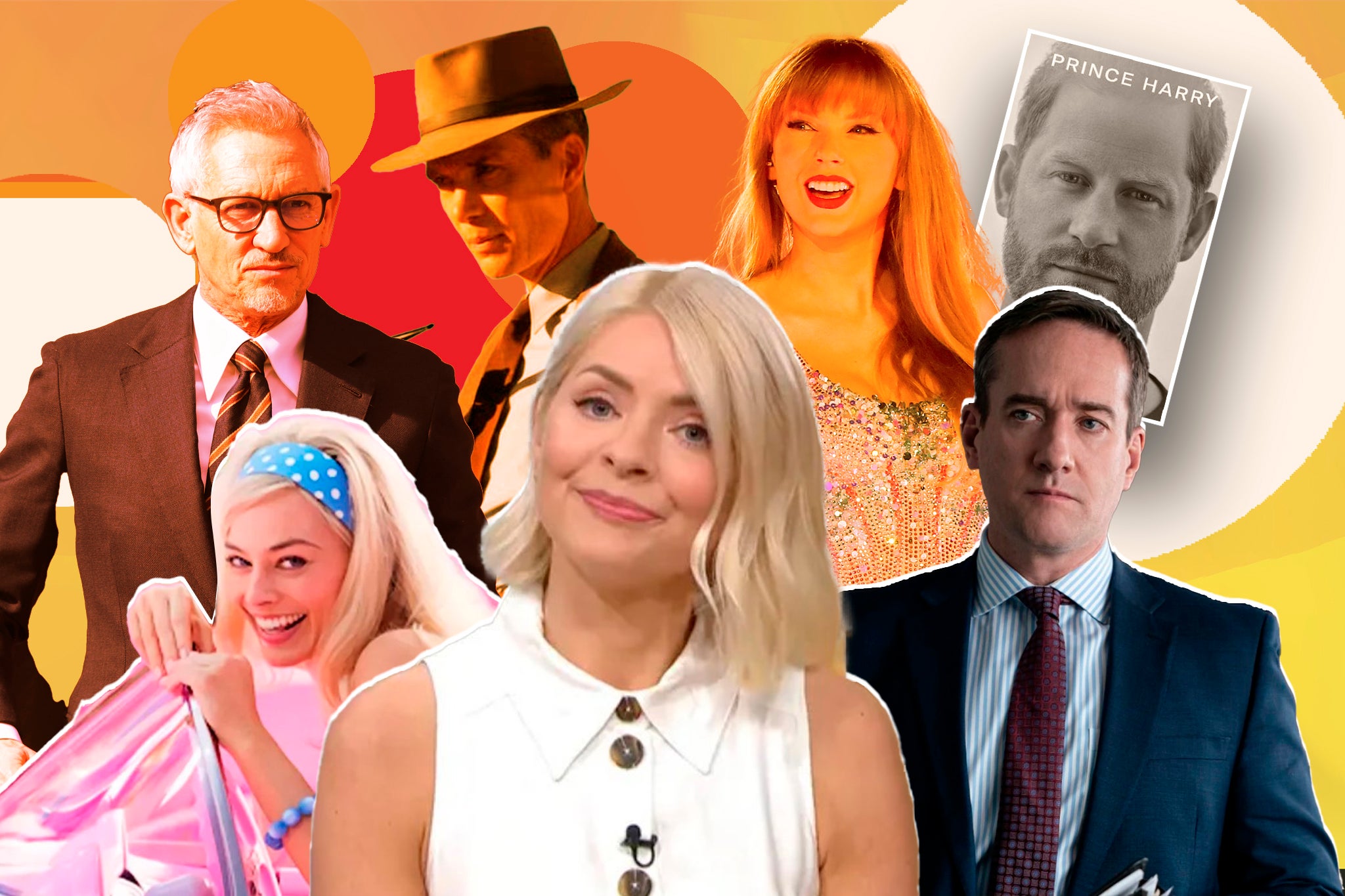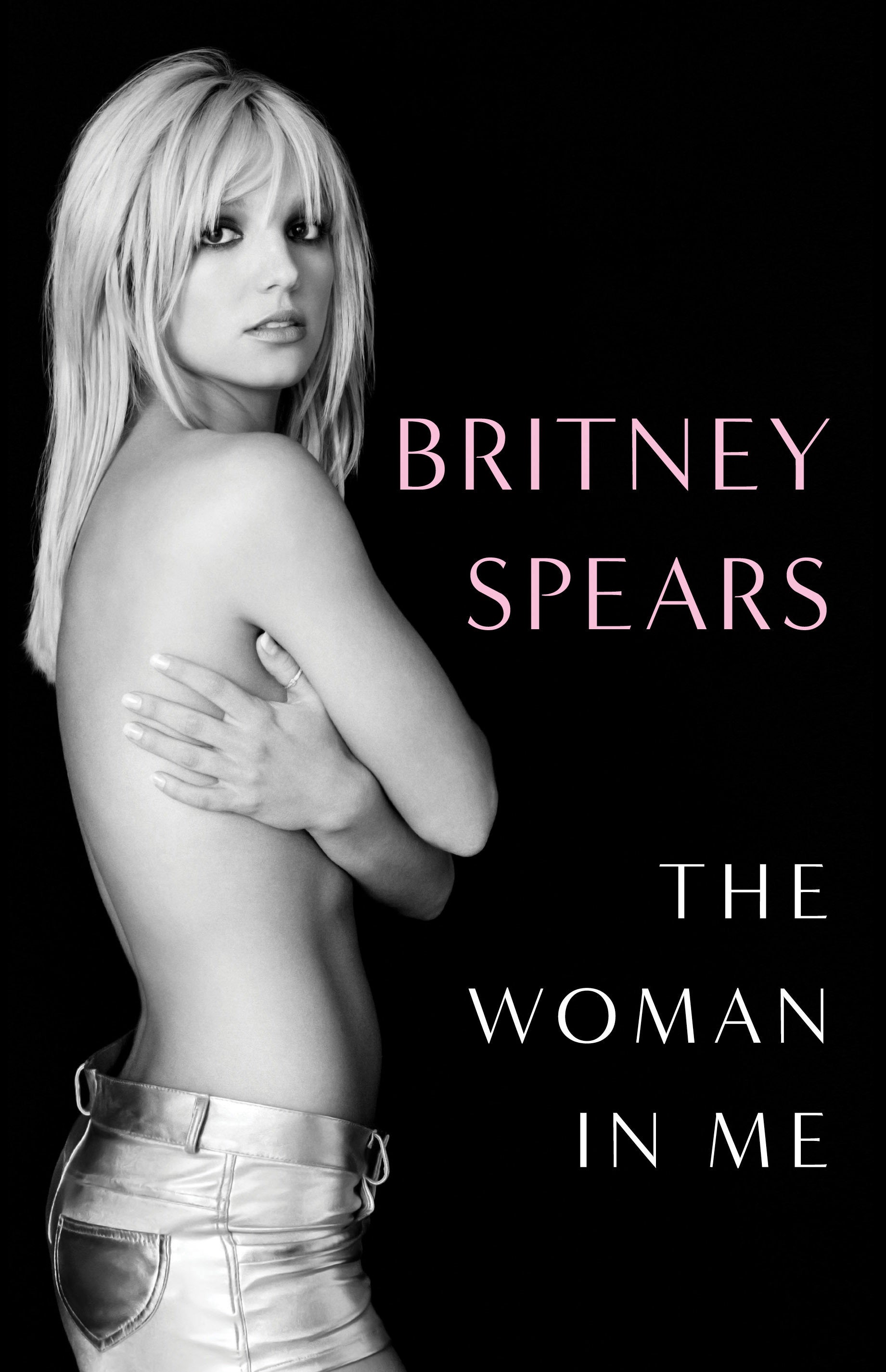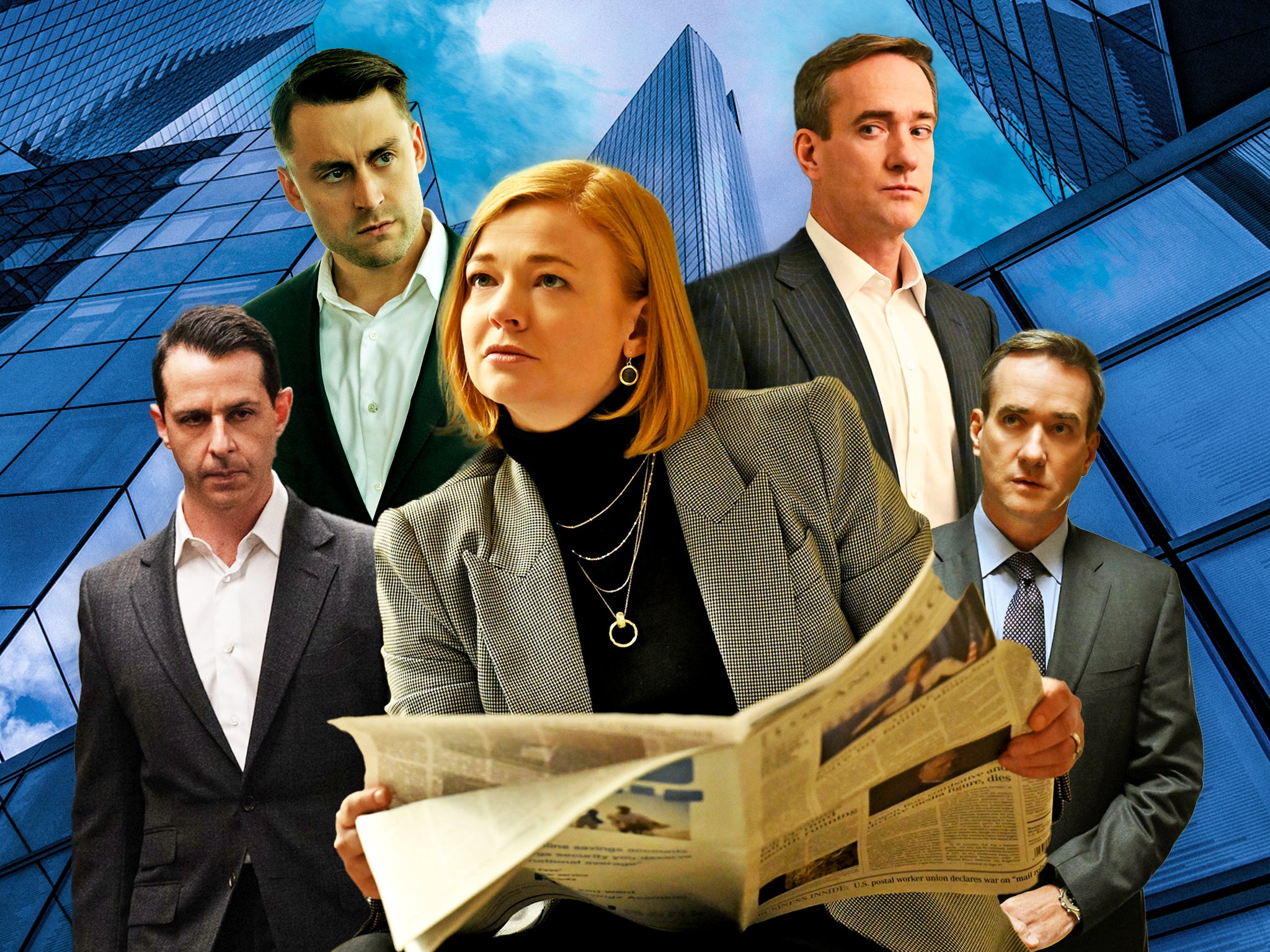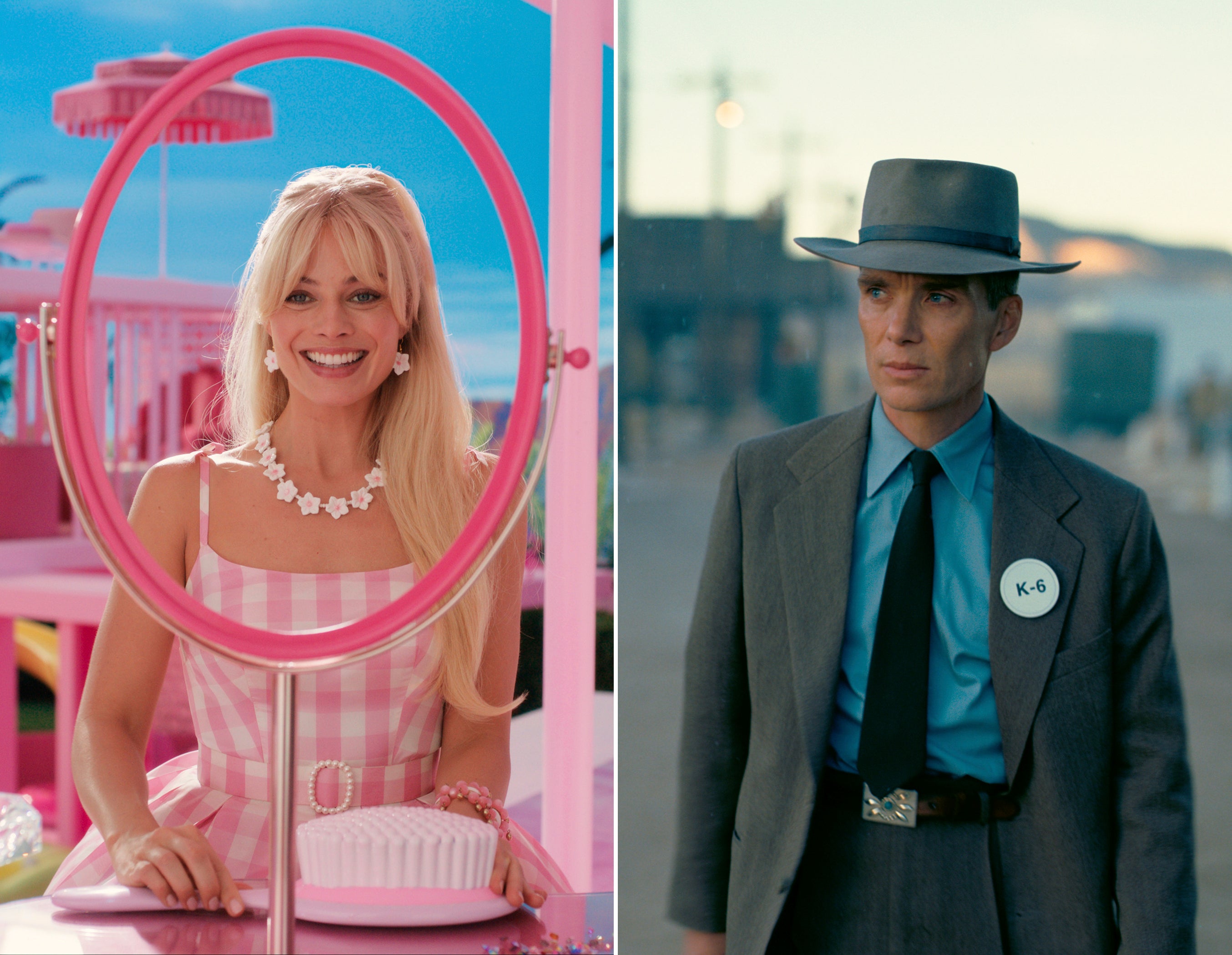Scandals, sensation and super-sized stars: in culture, 2023 has been a year of crisis and catharsis
From the sensational confessions in ‘Spare’ to the box-office thrills of Barbenheimer, Netflix documentaries offering A-list therapy and controversies at the BBC and GB News, 2023 hasn’t been a quiet year for culture, writes Jessie Thompson


Right… deep breath. Firstly, are you OK? It feels apt to borrow from Holly Willoughby’s infamous address to the nation because it has been quite a dramatic 12 months. In the world of culture, 2023 has been a year of both crisis and catharsis. When you think about it, things were pretty much falling apart everywhere you looked. For the first time in 63 years, actors and writers in America went on strike at the same time – in part because of the continued creative threat posed by AI. The triple whammy of Arts Council funding cuts, Covid aftershocks and the cost of living left the live arts reeling. The BBC was sucker-punched by controversies from all sides. There were high-profile scandals. Fallouts. Sensational memoirs. Heart-on-sleeve Netflix documentaries. When the stars haven’t been imploding, they’ve been reflecting on the time they imploded 20 years ago. It doesn’t feel like anyone has taken a deep breath.
Certainly not Prince Harry. His memoir Spare, released in January, was part psychological purge, part scorched-earth policy. Those thinking the self-exiled prince couldn’t have anything left to share after spilling the beans to Oprah and Netflix were quickly disabused. Across 416 furious pages, Harry told us about everything: his grief for his mother, his honest thoughts about his father’s second marriage, dog-bowl gate and Prince William, and, erm, the time he had a frostbitten “todger”. It didn’t bring down the royals, who kept a dignified silence – although one imagines this might be a bit of a weird Christmas – but it did cause a whole lot of stress for the publishers when copies accidentally went on sale early in Spain, with chapters being translated in real time ahead of publication. Ten months later, royal journalist Omid Scobie faced a translation mishap of his own: his book Endgame, a savage broadside on the firm, was somehow published in Dutch with the names of the alleged “royal racists”. The offending editions were quickly pulped, but – unlike Spare – the cock-up didn’t help sell copies: for all the noise, it sold just 6,448 in the UK in its first week.
It was Spare that would set the tone for the year, as we entered a new age of celebrity confessionalism. It became the fastest-selling non-fiction book of all time, shifting more than 3.2 million copies to date – but not far behind was Britney Spears, who sold a million copies in the US of her tell-all memoir The Woman in Me in its first week of publication. What were fans hoping for after years of not hearing from Britney, having battled to help free the singer from her conservatorship while wondering if it was really her posting those bizarre captions on Instagram? When we finally got her side of the story, it wasn’t pretty. “Raw, unfiltered and breathtaking in its rage,” was how my colleague Adam White described the book’s bleak portrait of life behind the scenes for one of the biggest stars of the Noughties.

With confession the cultural currency du jour, it became not just a way for celebrities to heal old wounds but revive a brand. Beckham on Netflix, directed by Succession star Fisher Stevens, reminded us how, at the height of their fame, no one could come close to Posh and Becks. The pair discussed everything from red cards to sarongs to their purple wedding outfits; it was powerfully nostalgic, but a little too shiny. A few months later, Netflix took a deep dive into the life and times of Robbie Williams, but on this occasion the nostalgia was tinged with something more troubling, as the “Angels” singer sat in his pants and watched old videos of himself spiralling out of control in front of millions of fans. On Disney Plus, Coleen Rooney gave her version of the Wagatha trial after winning the case in which Rebekah Vardy sued her for libel. The best revelation: Wayne got so swept up in it all that he started suggesting arguments to the lawyers and thought about going to law school.
For most of the year, though, cultural figures and institutions seemed to lurch from crisis to crisis, hoarding headlines across a number of explosive scandals. Willoughby’s much memed “Are you OK?” show opener came after weeks of pressure. First, reports of a feud dogged her and her This Morning co-host Phillip Schofield for weeks. He then left the show, because “ITV has decided the current situation can’t go on”. Why? What was the issue? We were soon to find out: it was revealed he had lied about an affair with a younger colleague. The show was in freefall, and Schofield, visibly shaking, sat down for an interview with the BBC’s Amol Rajan, revealing he believed his career was over and he was having suicidal thoughts. It was a brutal year for both presenters, who had been the face of British morning telly for years. In October, after reports of an alleged kidnap plot against her emerged, Willoughby also departed the This Morning sofa.
By this time the BBC had not long recovered from an internal mutiny, after Match of the Day host Gary Lineker was pulled off air for a tweet comparing the government’s rhetoric around immigration policy to 1930s Germany. Before long, co-stars stood with him in solidarity, ending up in a standoff with management, and the BBC briefly unable to air its usual sport output. (You have to wonder how much longer Lineker will hang around, now he’s dominated the world of podcasting with his Goalhanger Podcasts company, a successful side hustle where he can speak freely.) The whole thing showed that the Beeb was struggling to balance its impartiality rules with satisfying some of its biggest personalities. But it was nothing in comparison with the crisis that came next.

The Sun’s front page screamed “Top BBC Star in Sex Pics Probe” – and so began the guessing game. An information vacuum led to the finger being pointed at several other presenters, who had to deny compromising allegations that they had paid a teenager to strip off on a video call. Coming so soon after Schofield’s departure, the mood was unpleasantly bloodthirsty – debates abounded on privacy, ethics and duty of care. Eventually, Vicky Flind, the wife of the BBC news presenter Huw Edwards, put out a statement putting an end to the rumours, asking for privacy as her husband was now “receiving in-patient hospital care”. It was a torrid year for the BBC generally, with its chairman Richard Sharp resigning in April after making an undeclared loan to Boris Johnson, and Newsnight one of the shows facing deep staff cuts.
Of course, it isn’t easy running a news channel, as GB News proved. Presenter Dan Wootton – currently facing a number of allegations about inappropriate behaviour himself – prompted the most Ofcom complaints of the year, when he smirked along with Laurence Fox’s misogynist rant about politics journalist Ava Evans. “Who’d wanna shag that?” Fox asked, apparently as a part of a conversation about the male suicide crisis. “She’s a very beautiful woman, Laurence,” Wootton replied, trying to add “a touch of balance”. Subsequently, Fox was sacked and Wootton suspended and taken off air. (Honourable mention for GB News presenter Martin Daubney, who struggled with the demands of delivering the breaking story of escaped prisoner Daniel Khalife on air: “This is breaking news, it’s fast, happening,” he spluttered, before calling him “the terror man”.)
One of the most stomach-churning scandals of the year, though, were allegations reported by Channel 4’s Dispatches and The Times and Sunday Times about comedian Russell Brand. Four women, one of whom had been just 16 at the time, accused him of sexual assaults and controlling predatory behaviour; one accused him of rape. Brand – once heralded as a refreshing political firebrand for saying on Newsnight that people shouldn’t vote in elections – appeared on his YouTube channel to deny the allegations in a blaze of conspiracy theory babble. “Is there another agenda at play?” he asked while manically waving his arms. “We’ve seen coordinated media attacks before.” Apparently, his commenters had warned him, “Watch out Russell, you’re getting too close to the truth”. This month, he was questioned by the Metropolitan Police for the second time, regarding six further allegations of historical sexual offences.

So, did anyone have a good year? Well, for those who worship at the feet of Ted Lasso star Hannah Waddingham, it was a genius decision to have her present Eurovision, which was held in the UK as 2022 winners Ukraine were unable to host. “Hannah Waddingham speaking French has made me bisexual,” wrote one tweet after she had warbled, shimmied and spoken in another language. Having carved out an unsung career in theatre for years, she became a national treasure overnight. And while The Crown may have bowed out not with a bang but a whimper, Netflix issued its first report on its viewers’ habits, asserting its total dominance among the streamers at the same time: nearly 100 billion hours of content was watched.
The return on ITV2 of Big Brother was one of the year’s low-key telly triumphs, with a brilliantly cast set of characters, although Nigel Farage’s £1.5m stint on I’m a Celeb proved to be a snoozefest. After three series, Happy Valley ended with a triumphant finale in which sweary copper Catherine Cawood won the battle between good and evil with criminal Tommy Lee Royce, while on HBO, The Last of Us became the first genuinely good video game adaptation. And Succession secured its place in the prestige drama hall of fame with a finale that left us shocked and satisfied: of course, soulless corporate stooge Tom Wambsgans was going to take the crown.

From one crowning to another: the coronation concert was a bizarre affair, in which it was left – incongruously – to Katy Perry to turn up and put on a show. Madonna came back from a major health scare to show why she’s the queen of pop: she’s 65 and still doing all the dance moves on her major worldwide Celebration tour, which opened in London. Elton John delivered a storming set at Glastonbury, while Girls Aloud announced the first Noughties pop reunion in ages that actually feels right (they seem motivated primarily by the wish to honour late member Sarah Harding). Of course, it was Taylor Swift’s year, with her being named Time Person of the Year for being, the magazine’s editor said, “the rare person who is both the writer and the hero of her own story” (she was depicted on the cover with one of her cat’s draped across her shoulders). As she continued to re-record her old albums in a battle to own her own masters recordings, Swift also became the most streamed female artist in Spotify history. Her three-hour Eras tour generated both $1.04bn and seismic activity equivalent to a 2.3 magnitude earthquake.
After the drama of last year’s slapgate, 2023’s Hollywood awards season could only feel dull in comparison. It didn’t help that films that were rewarded (Everything Everywhere All at Once, The Whale) won’t be remembered. Richard E Grant got stage fright presenting the Baftas, Hugh Grant was slightly brusque during an Oscars red carpet interview, and all that could be salvaged was a meme of Ariana DeBose saying “Angela Bassett did the thing” during a deeply eccentric pre-show feminist rap. A few months later, the industry ground to a halt with the writers and actor’s strike – the first by the American actors’ union Sag-Aftra in more than 40 years – as creatives campaigned for better residuals and regulation of AI from streamers and studios.

At least when the films did come, they were huge. Barbie and Oppenheimer, released on the same day, became a cultural moment so big it got its own portmanteau: Barbenheimer. The films took £30m on their UK opening weekend – the biggest box office numbers since 2019. Which should you see first – Christopher Nolan’s three-hour black and white history of the man behind the atom bomb? Or Greta Gerwig’s neon pink feminist-lite feelgood comedy, in which Ryan Gosling became an Oscar frontrunner for playing a Ken doll? Whatever choice you made, it was one of the most truly communal cinematic experiences for several years.
A worrying exodus of artistic directors – at least 14 across the country in the last two years – pointed to the challenges of running a theatre post-Covid, in the age of the cost-of-living crisis. Some, of course, left because it was time to hand over the baton, with Vicky Featherstone departing the Royal Court, to be succeeded by David Byrne from the New Diorama Theatre, and Rufus Norris replaced at the National Theatre by former Kiln boss Indhu Rubasingham, who will take over in 2025. The latter – the NT’s first female director in its 60-year history – was a popular choice. As the English National Opera’s relocation row rumbled on – the institution was ordered to leave London or lose its Arts Council funding – it was eventually announced that Manchester would become its new home.
In the West End, it all got a bit much for some audience members watching the West End adaptation of A Little Life, starring James Norton – there were fainters during some of the show’s graphic scenes of self-harm. Bad audience behaviour was also under the spotlight, reaching its nadir when police were called to a performance of The Bodyguard in Manchester, as two audience members refused to stop singing. The ensuing row got so fiery that friendly This Morning host Alison Hammond had to issue an apology for “making light” of the situation. And, amid a so-so year for theatre in general, only truly epic success was Jamie Lloyd’s revival of Sunset Boulevard. The orchestra was loud, the emotions were massive, and there was a deliciously diva-sized central performance from Nicole Scherzinger.

In the world of books, the Granta Young British Novelists list, issued once a decade, also pointed to change. Although only four men featured on the 20-strong list, it was highly literary and lacking in recognisable names – perhaps most notably the one novelist below the age of 40 to have made the most impact in the last 10 years: Sally Rooney. (Strictly speaking, she was not eligible due to being Irish – but the void put the relevance of the list under scrutiny.) The Women’s Prize chose a refreshingly readable novel for its 2023 winner – Barbara Kingsolver’s excellent Demon Copperhead, which transported David Copperfield to 1990s opioid-struck America, and made her the first author to win the prize twice. The Booker featured three Pauls on its shortlist, with Paul Lynch taking the prize for his dystopian Prophet Song, even though many felt Paul Murray’s tragicomedy The Bee Sting a more rightful winner. In art, it was the big names that pulled in the crowds, with David Hockney’s immersive show at new venue the Lightroom winning five-star reviews, and Marina Abramovic becoming the first woman to have a solo show in the Royal Academy’s main galleries. Winning the Turner Prize for works that “unsettle perceived notions of labour, class, Britishness and power”, Jesse Darling criticised Margaret Thatcher for starting a trend for cutting back art education.
The void left by the sheer number of talents we lost this year is vast. There were acting greats such as Michael Gambon, Glenda Jackson, Julian Sands. Literary legends Martin Amis, AS Byatt and Benjamin Zephaniah. Music icons Tina Turner, Sinead O’Connor and Shane MacGowan, and TV heroes such as Paul O’Grady, Len Goodman, John Motson, Michael Parkinson. And, in October, the death of Friends star Matthew Perry, at just 54, which left so many shattered. What we can be grateful for is the many pleasures they left behind.
As crisis followed crisis, confessions revealed long years endured of absent compassion, and controversies swirled and swirled, it could not be said that 2023 was easy. But there were moments of light in the dark. Perhaps that was best encapsulated by novelist Hanif Kureishi, who was left paralysed last year after a Boxing Day fall in Rome. Rather than sink into despondency, he continued to write from his hospital bed, with the help of his family. “I’m sure many painters, writers, architects, sports people and gardeners love their tools, and see their tools as an extension of their body,” he wrote in one hospital dispatch in early January. “I hope one day I will be able to go back to using my own precious and beloved instruments.” His determination to fight back was an inspiration to us all – and showed that keeping the creative flame alive is worth fighting for.
Join our commenting forum
Join thought-provoking conversations, follow other Independent readers and see their replies
Comments
Bookmark popover
Removed from bookmarks